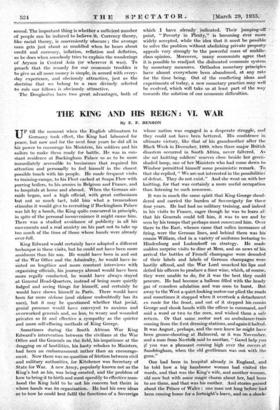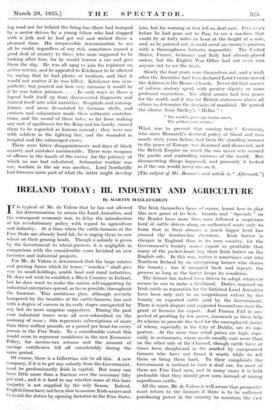THE KING AND HIS REIGN : VI. WAR
By E. F. BENSON UP till the moment when the. English ultimatum to Germany took effect, the King had laboured for peace, but now and for the next four years he did all in his power to encourage his Ministers, his soldiers and his sailors to make them ready for battle. He was in con- stant residence at Buckingham Palace so as to be more immediately accessible to businesses that required his attention and personally to feel himself in the closest possible touch with his people. He made frequent visits to training-camps, to his Fleet cached at Scapa Flow with purring boilers, to his armies in Belgium and France, and to hospitals at home and abroad. When the German air-, raids began, and a high official, with great enthusiasm but not so much tact, told him what a tremendous • stimulus it would give to recruiting if Buckingham Palace was hit by a bomb, the King quite concurred in principle, in spite of the personal inconvenience it might cause him. There was a studied avoidance of publicity in all his movements and a real anxiety on his part not to take up too much of the time of those, whose hands were already over-full.
King Edward would certainly have adopted a different technique in these visits, but he could not have been more assiduous than his son. He would have been in and out of the War Office and the Admiralty, he would have in- sisted on lengthier and more constant interviews with organizing officials, his journeys abroad would have been more regally conducted, he would have always stayed at General Head-Quarters, instead of being more quietly lodged and seeing things for himself, and certainly he would have shown himself in Paris. There would have been far more reclanie (and Tectonic undoubtedly has its uses), but it may be questioned whether that jovial, genial presence would have conveyed to anxious and overworked generals and, no less,. to weary and wounded privates so fit and effective a sympathy as the quieter and more self-effacing methods of King George.
Sometimes during the South African War King Edward's intervention between the civilians at the War Office and the Generals on the field, his impatience at the dragging on of hostilities, his hasty rebukes to Ministers, had been an embarrassment rather than an encourage- ment. Now there was no question of friction between civil and military authorities, for Kitchener was Secretary of • State for War. A new Army, popularly known not as the • King's but as his, was being created, and the problem of how to bring it to birth and most speedily to effective man- hood the King held to be not his concern but -theirs in whose hands was its organization. He had his own ideas as to how he could best fulfil the functions of a Sovereign whose nation was engaged in a desperate struggle, and they could not have, been bettered. His confidence in ultimate victory, like that of his grandmother- after the Black Week in December, 1899, When, three major British' disasteri occurred in South Africa, never faltered. As she sat knitting soldiers' scarves- close beside her green.- shaded lamp, one of her Ministers who had come doWn to Windsor permitted himself some pessimistic remark. To that she replied, " We are not interested in the possibilities of defeat. They do not exist." And she Went on with her knitting, for that was certainly a more useful occupation than listening to such nonsense. - . It was in much the same spirit that King George shoul- dered and carried the burden of Sovereignty for these four years. He had had no military training, and indeed in his visits to France, eager though he was to learn all that his Generals could tell him, it was to see and be Seen by his troops that perhaps most concerned him. Over there to the East, whence came that sullen incessance of firing, were the German lines, and behind them was his cousin William, clad in a variety of uniforms lecturing to . Hindenburg and Ludendorff on strategy. He made sudden surprise visits to dine at Mess, and on news of his, arrival the bottles of French' champagne were denuded of their labels and labels of German champagne were hastily affixed, and the War Lord smacked his lips and defied his officers to produce a finer wine, which, of course, they were unable to do, for it was the best they could procure. He had become a balloon filled with the heady gas of -ceaseless adulation and was soon to burst. But away to the West a quiet-looking motor-car plied the roads and sometimes it stopped when it overtook a detachment en route for the front, and out of it stepped his cousin George and shook hands with the officer in command, and said a word or two to the men, and wished them a safe return.. Or that same motor met an ambulance-train coming from the first dressing-stations, and again it halted. It was August, perhaps, and the men knew he might have been grouse-shooting at Balmoral, or it was November, and a man from Norfolk said to another, " Gawd help you if you was a pheasant coming high over the covers at Sandringham, when the old gentleman was out with the guns."
• One had been in hospital already in England, and he told how a big handsome woman had visited the wards, and that was the King's- wife, and another woman, old now 'but with some magic charm about her, had been to see them, and that was his mother. And stories passed about the Prince of Wales : one man not long before had been coming home for a fortnight's leave, and on a shock- ing road not far behind the firing-line. there had bumped by a motor. driven by a young fellow who had stopped with a jerk and he had got out and wished theni a pleasant time. His irrepressible determination to see all he .could, regardless of any risk, sometimes caused a good .deal. of. anxiety to those. who were supposed to be looking after him, for he would borrow a• car and give them. the .slip."- He was all agog to join his regiment on active service, and he appealed. to Kitchener to be allowed to, saying that he had plenty of brothers, and that it would not matter if he was killed. Kitchener was sym- pathetic, but, pointed out how very tiresome it would be if he was taken prisoner. . . . In such ways as these a legend built itself up from disconnected fragments and framed itself into solid narrative. Hospitals and nursing- homes, and areas devastated by German shells, and cruisers and submarines made their authentic contribu tions, and the moral of these tales, so far from making any sort of apotheosis for the King and his family, caused them to be regarded as human instead ; they were one with soldiers in the fighting line, and the wounded in hospital and the submerged crews.
There were bitter disappointments and days of black anxiety and mistakes innumerable. There were weapons of offence in the hands of the enemy for the potency of which no one had calculated. Submarine warfare was one, warfare in the air was another, Lord Northcliffe had foreseen some part of what the latter might develop into, but his warning at first fell on deaf ears. Five year before he had gone out to Pau, to see .a machine that could fly at forty miles an hour at the height of a mile, and, as he pointed out, it could scout an enemy's position with a thoroughness hitherto impossible. The United States, France, Germany and Italy had already placed orders, but the English War Office had not even sent anyone out to see the trials.
Slowly the four years wore themselves out, and a week after the Armistice had been declared Lord Curzon moved ,s• the Address in the House of Lords. Never did that master • of solemn oratory speak with greater dignity or more profound conviction. The allied armies had won peace for the world, and it was for British statesmen above all others to determine the destinies of mankind. He quoted the chorus from Shelley's " Hellas ' :
" The world's great age begins anew, The golden years return."
What was to prevent that coming true ? Germany, who since Bismarck's declared policy of blood and iron nearly sixty years before, had been the standing menace to the peace of Europe, was disarmed and disnavied, and the British Empire on which the sun never sets seemed the pacific and controlling mistress of the world. But disconcerting things happened, and presently it looked as if the sun would never rise on it.
[The subject of Mr. Benson's next article is " Aftermath."'







































 Previous page
Previous page